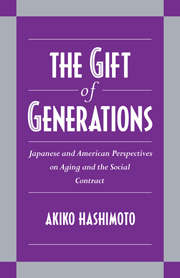Crossref Citations
This Book has been
cited by the following publications. This list is generated based on data provided by Crossref.
Silver, Catherine B.
1998.
Handbook of Aging and Mental Health.
p.
383.
Willmore, Larry
1998.
Social Security and the Provision of Retirement Income.
SSRN Electronic Journal ,
Levy, Becca R.
1999.
The Inner Self of the Japanese Elderly: A Defense against Negative Stereotypes of Aging.
The International Journal of Aging and Human Development,
Vol. 48,
Issue. 2,
p.
131.
Campbell, Ruth
1999.
Long-Term Care for Frail Older People.
p.
13.
Wenger, G. Clare
and
Jingming, Liu
1999.
Support Networks in Beijing (China) and Liverpool (UK): Differences and Similarities.
Hallym International Journal of Aging,
Vol. 1,
Issue. 2,
p.
46.
Janevic, Mary R.
Ajrouch, Kristine J.
Merline, Alicia
Akiyama, Hiroko
and
Antonucci, Toni C.
2000.
The Social Relations–Physical Health Connection: A Comparison of Elderly Samples from the United States and Japan.
Journal of Health Psychology,
Vol. 5,
Issue. 4,
p.
413.
Asakawa, Tatsuto
Koyano, Wataru
Ando, Takatoshi
and
Shibata, Hiroshi
2000.
Effects of Functional Decline on Quality of Life among the Japanese Elderly.
The International Journal of Aging and Human Development,
Vol. 50,
Issue. 4,
p.
319.
Risseeuw, Carla
2000.
Aging: A Gendered Policy Concern in the South and the North.
Asian Journal of Women's Studies,
Vol. 6,
Issue. 2,
p.
11.
Webb, Philippa
2002.
Time to Share the Burden: Long Term Care Insurance and the Japanese Family.
Japanese Studies,
Vol. 22,
Issue. 2,
p.
113.
Wisensale, Steven K.
2003.
Global Aging and Intergenerational Equity.
Journal of Intergenerational Relationships,
Vol. 1,
Issue. 1,
p.
29.
Traphagan, John W.
2003.
Independence, Security, and the Intergenerational Social Contract: Home-Helper Services and Elder Care in Rural Japan.
Care Management Journals,
Vol. 4,
Issue. 4,
p.
216.
Koropeckyj‐Cox, Tanya
2003.
Ways of Aging.
p.
75.
IZUHARA, MISA
2005.
Residential Property, Cultural Practices and the ‘Generational Contract’ in England and Japan.
International Journal of Urban and Regional Research,
Vol. 29,
Issue. 2,
p.
327.
Hashimoto, Akiko
and
Ikels, Charlotte
2005.
The Cambridge Handbook of Age and Ageing.
p.
437.
Kikuzawa, Saeko
2006.
Multiple Roles and Mental Health in Cross-Cultural Perspective: The Elderly in the United States and Japan.
Journal of Health and Social Behavior,
Vol. 47,
Issue. 1,
p.
62.
Traphagan, John W.
2006.
Power, Family, and Filial Responsibility Related to Elder Care in Rural Japan.
Care Management Journals,
Vol. 7,
Issue. 4,
p.
205.
Levey, Tania
and
Silver, Catherine B.
2006.
Gender and Value Orientations—What’s the Difference!? The Case of Japan and the United States.
Sociological Forum,
Vol. 21,
Issue. 4,
p.
659.
Tsukada, Noriko
and
Saito, Yasuhiko
2007.
Factors that Affect Older Japanese People’s Reluctance to Use Home Help Care and Adult Day Care Services.
Journal of Cross-Cultural Gerontology,
Vol. 21,
Issue. 3-4,
p.
121.
Koropeckyj-Cox, Tanya
and
Call, Vaughn R. A.
2007.
Characteristics of Older Childless Persons and Parents.
Journal of Family Issues,
Vol. 28,
Issue. 10,
p.
1362.
Lai, Daniel W.L.
2007.
Cultural Predictors of Caregiving Burden of Chinese-Canadian Family Caregivers.
Canadian Journal on Aging / La Revue canadienne du vieillissement,
Vol. 26,
Issue. S1,
p.
133.



